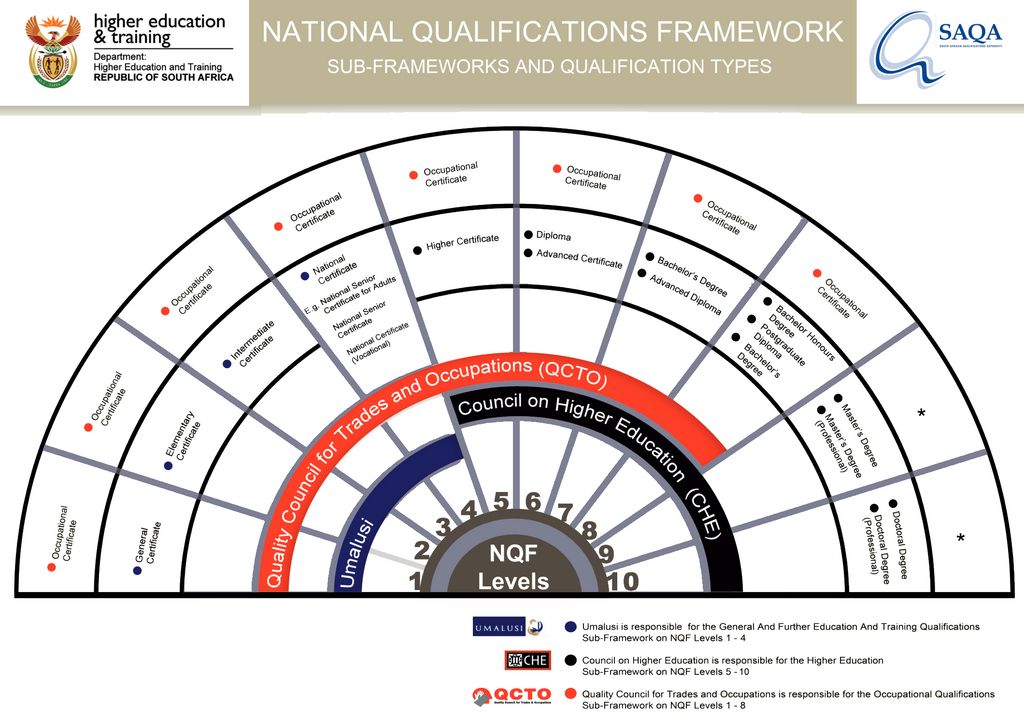The South African Qualifications Authority (SAQA) is a professional statutory body that manages the National Qualifications Framework (NQF), which helps organise and standardise educational qualifications in South Africa. The NQF is essential for ensuring that qualifications meet both local and international standards. It includes ten levels, from basic education to advanced training, offering a clear path for advancing educational and professional goals.
The main aim of the NQF is to create a consistent framework across different educational areas, making it easier to compare and understand qualifications. In other words, it improves transparency within the education system. As a result, by aligning educational outcomes with the job market’s needs, the SAQA NQF levels help build a skilled and flexible workforce. In this article, we will give a detailed breakdown of the NQF levels, exploring their credits and qualifications.
Table of Contents

Detailed Breakdown of SAQA NQF Levels
The National Qualifications Framework (NQF) in South Africa is divided into ten levels. Each level represents a different stage of learning and career development. These levels range from basic education to advanced professional qualifications, covering a wide variety of learning achievements. Here is a simple overview of each level:
SAQA NQF Level 1
NQF Level 1 is equivalent to Grade 9 in the South African education system. It provides the foundation of a student’s education, developing essential skills and knowledge for future academic and vocational goals.
SAQA NQF Level 2
NQF Level 2 corresponds to Grade 10 and the National Vocational Certificate Level 2. This level bridges foundational education with more specialised academic and vocational pathways.
SAQA NQF Level 3
NQF Level 3 is equivalent to Grade 11 and the National Vocational Certificate Level 3. It deepens academic knowledge and vocational skills, preparing students for higher-level education and training.
SAQA NQF Level 4
NQF Level 4 is the end of high school education, equal to Grade 12/Matric and the National Vocational Certificate Level 4. It gets students ready for college or starting a job.
SAQA NQF Level 5
NQF Level 5 includes Higher Certificates and Advanced National Vocational Certificates. It connects high school education to college or the workforce, making people more employable and setting the stage for continued learning and career growth.
SAQA NQF Level 6
NQF Level 6 includes qualifications like the National Diploma and Advanced Certificate. These combine academic learning with practical skills, prepares students for success in their careers or further studies by meeting industry needs.
SAQA NQF Level 7
NQF Level 7 includes Bachelor’s Degrees and Advanced Diplomas. These qualifications offer a wide range of educational opportunities. Thus preparing students for professional careers or further academic studies.
SAQA NQF Level 8
NQF Level 8 includes Honours Degrees, Postgraduate Diplomas, and Professional Qualifications. These advanced qualifications allow for deep academic study and professional growth, boost expertise and benefit various industries.
SAQA NQF Level 9
NQF Level 9 is for Master’s Degrees. These qualifications focus on advanced research and specialisation. It creates highly skilled professionals and academics who contribute greatly to their fields, the economy, and society.
SAQA NQF Level 10
NQF Level 10 is the highest level, represented by Doctorate degrees. This level signifies top academic and professional achievement, showing a strong commitment to academic excellence, independent thinking, and major contributions to a field of study.

SAQA NQF Level: Credits and Qualifications
Each level has a specific credit range that shows the required time and effort. Credits can differ from one university or institution to another based on their programmes and courses. Here’s the SAQA NQF levels table that gives you a clearer idea of how credits are allocated:
| NQF Levels | Qualification Type | Credits |
| NQF Level 1 | General Education and Training Certificate (GETC) | 120 |
| NQF Level 2 | National (vocational) Certificates level 2 | 120 |
| NQF Level 3 | National (vocational) Certificates level 3 | 120 |
| NQF Level 4 | Further Education and Training Certificate (FETC) | 120 |
| NQF Level 5 | Higher Certificate (HC) | 120 |
| NQF Level 6 | Diploma / Advanced Certificate | 240 / 120 |
| NQF Level 7 | Bachelor’s Degree / Advanced Diploma | 360 / 120 |
| NQF Level 8 | Honours Degree / Postgraduate Diploma | 120 |
| NQF Level 9 | Master’s Degree | 180 (For some universities, it can be 200-230) |
| NQF Level 10 | Doctoral Degree | 360 |
The table illustrates the SAQA NQF levels and credits, which help students understand the effort and time needed for each qualification.
SAQA NQF Levels Diagram

What are NQF Level Descriptors?
NQF Level Descriptors are detailed guidelines from the South African Qualifications Authority (SAQA) that outline what students need to know and be able to do at each NQF level. These guidelines cover ten main areas:
- Scope of knowledge
- Knowledge literacy
- Method and procedure
- Problem-solving
- Ethics and professional practice
- Accessing, processing and managing information
- Producing and communicating information
- Context and systems
- Management of learning
- Accountability
These Level Descriptors are important because they clearly state what is needed at each level, making sure all qualifications are consistent. They help ensure that qualifications meet the right standards by providing a clear benchmark. Moreover, they guide teachers in creating relevant programmes and assessments so education stays effective and up-to-date. They also make it easier to recognise skills learned outside of formal education, giving learners more opportunities.
Resources and Documentation of SAQA NQF Levels
If you want to learn more about the NQF levels, you can visit the official website of SAQA. On the website, you will find documents and the SAQA NQF levels PDF. These documents include in-depth explanations, credit requirements, and level descriptors. So, to access the documentation, you can follow the steps given below:
- Step 1: Check the SAQA website
- Step 2: You can go to the ‘Research Library’ on the navigation bar
- Step 3: In the ‘Research Library’, you can go to ‘NQF Research Portal’ and ‘Documents’
- Step 4: Download the relevant PDFs for detailed information
How SAQA NQF Levels Impact Education and Careers?
Understanding SAQA NQF levels is key for guiding your education and career choices. These levels give clear steps for moving through different stages of learning. However, the SAQA NQF levels offer more benefits than just a structured progression. Here are the key impacts of SAQA NQF Levels:
- NQF levels show the steps to advance in education and career.
- Itensures your qualifications are valued across various fields.
- It helps you understand what different qualifications mean.
- Employers use NQF levels to assess qualifications and skills.

Conclusion
In conclusion, the South African Qualifications Authority’s (SAQA) National Qualifications Framework (NQF) is a crucial tool for organising and standardising educational qualifications in South Africa. It provides a clear path from basic education to advanced degrees, making it easier to understand and compare qualifications across different fields. Moreover, the NQF level descriptors ensure that qualifications meet high standards and stay relevant to industry needs, helping create a skilled and adaptable workforce. We hope you have gained insights into the importance of SAQA NQF levels by reading our article.
At Regenesys, we have programmes registered with SAQA. You can access programmes for NQF Levels 5, Level 7, Level 8, Level 9, and Level 10. To explore these programmes and find the one that suits your educational and career goals, visit the Regenesys website today!
Explore Our Other Programmes
SAQA NQF Levels – FAQs
What are the different NQF levels, and what do they represent?
The SAQA NQF levels 1-10 represent a different stage of learning and career development. The levels range from basic education (Level 1) to advanced professional qualifications (Level 10).
How does the NQF benefit students and employers?
The NQF ensures that qualifications are recognised across various fields and helps students to align their educational outcomes with job market needs. Employers use NQF levels to assess candidates’ qualifications and skills, which aids in hiring decisions.
What are NQF Level Descriptors?
NQF Level Descriptors are guidelines from SAQA outlining the knowledge and skills students need at each NQF level. They cover areas such as scope of knowledge, problem-solving, ethics, and information management.
How can I access resources and documentation about SAQA NQF levels?
You can access detailed information about SAQA NQF levels by visiting the SAQA website. Navigate to the ‘Research Library’ and then to the ‘NQF Research Portal’ to find and download relevant PDFs that include explanations, credit requirements, and level descriptors.
What qualifications are available at NQF Level 6?
NQF Level 6 qualifications include a National Diploma and an Advanced Certificate. These qualifications combine academic learning with practical skills and prepare students for career advancement or further studies by meeting industry needs.
What opportunities are available after completing NQF Level 1?
After NQF Level 1 (Grade 9), students can continue to NQF Level 2, which includes further academic or vocational education, such as Grade 10 or National Vocational Certificate Level 2 programs, to specialize in specific career pathways.
How does NQF Level 2 prepare students for future studies?
NQF Level 2 bridges foundational education with more specialized academic and vocational studies, preparing students for deeper learning in Grade 11 or National Vocational Certificate Level 3.
What can students do after completing NQF Level 3?
After completing NQF Level 3, students can progress to NQF Level 4, which includes Grade 12 (Matric) or the National Vocational Certificate Level 4, providing further opportunities for college education or employment.
What is the significance of NQF Level 4 for career readiness?
NQF Level 4 marks the completion of high school (Matric), equipping students with the skills and qualifications needed for college or entry-level employment opportunities.
What can I do with a qualification at NQF Level 5?
An NQF Level 5 qualification, like a Higher Certificate, improves employability and prepares students for further studies at NQF Level 6, such as pursuing a National Diploma or an Advanced Certificate.






